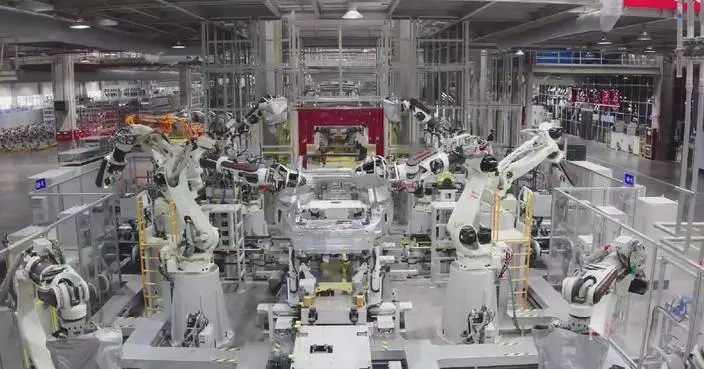China will roll out more measures to boost the development of its venture capital industry in an effort to promote the country's sic-tech innovation, industrial upgrading, and high-quality development, according to a State Council executive meeting chaired by Premier Li Qiang on Wednesday.
The meeting noted that efforts should be made to ease bottlenecks and tear down barriers in the venture capital cycle, including fundraising, investment, management and exit.
According to an official of China's National Development and Reform Commission, in terms of fundraising, qualified social capital will be encouraged to be more patient. For investment, the focus will be on where the capital should be channeled. In terms of management, consistent efforts will be made to strengthen the management of venture capital funds run by the government and state-owned companies and to implement and refine tax relief policies targeting venture capital companies. At the same time, regulatory policies to be implemented will differentiate between venture capital funds and privately offered funds. In terms of exist, expanding the exit channel will be a major focus as part of the efforts to optimize the exit policies for venture capital funds.
The meeting added that efforts should be made to support qualified sci-tech enterprises to go public in domestic and international markets, and to promote the virtuous cycle of the venture capital industry.
It also stressed the necessity to consolidate the institutional foundation for healthy development of venture capital, implement key measures for capital market reform, improve the functions of the capital market, and further stimulate vitality of the venture capital market.
Data show that over recent years, investment of China's venture capital has been increasing and the number of the country's startups has been growing as well.
According to Rhino Data, a venture capital data platform, in 2023 China saw the number of its startups jump to over 10 million, up 48 percent compared with 2018.
Over the first half of this year, the number of large-scale financing cases of venture capital and private capital investment further increased, with the 26 largest cases, each involving one billion yuan (140 million U.S. dollars) or more, altogether raised nearly 65 billion yuan (over 9 billion U.S. dollars), representing 33 percent of the total investment on the market and increasing by 1.6 percent year over year, according to Zero2IPO Research.
Sci-tech sectors like semiconductor and IT service still maintain strong appeal to institutional investors, with a majority of large investment being drawn to hard technology industries, Zero2IPO Research's data showed.

China to roll out measures to boost development of venture capital industry
The U.S. Federal Reserve's long-awaited rate cuts, reflect a cautious approach to a growing but uncertain economy, where a resurgence in manufacturing is countered by fluctuating consumer spending and concerns about the sustainability of current growth, according to a UK economist.
The U.S. Federal Reserve announced that it will slash the target range for the federal funds rate by 50 basis points, marking the first rate cut since March 2020 and signaling the start of a monetary policy easing cycle.
Instead of implementing a 25-basis-point cut, the Fed opted for an unusually large 50-basis-point reduction, indicating its confidence in the downward trend of inflation and highlighting its concerns about the weakening job market, analysts noted.
Whether this larger-than-typical rate cut can stabilize the slowing job market and mitigate potential risks to the U.S. economy remains to be seen. A soft landing isn't a done deal.
Vicky Pryce, chief economic adviser at the Center for Economics and Business Research, believes despite some positive economic indicators such as job growth and rising manufacturing, the U.S .interest rate cut was necessary due to concerns over future economic uncertainty.
"I think the U.S. cut had to come. As you've been hearing, they should have cut earlier and they finally did. It's a question as to whether they're worried seriously about the economy and how it might move in the future because it is true that for the moment what you're seeing is that the labor market, yes it's looking a little bit tricky, but overall it's not doing badly. Yes, unemployment has gone up a little bit overall, over the last few months, but it isn't huge. And what you've also got, of course, is an economy which is still growing. And second quarter figures were better than the first quarter figures. There is still strength there, we've seen manufacturing suddenly start picking up again in the U.S. after a few months of drops, so there is something there, but I think there is a lot of uncertainty and insecurity in the country right now,”said Pryce.
The central bank is worried that fluctuating consumer spending and delayed effects of past rate hikes could abruptly end current growth, potentially leading to a recession, Pryce noted.
"So the consumer, yes perhaps they are spending. One month they do, the other month they don't. Look at what has been going on in the UK. So in other words, there are concerns that what we're seeing right now in terms of reasonable growth is not going to persist. And it's not just what may happen in November with the presidential elections. It's also that the impact of those interest rate increases that the Fed had imposed and other countries as well take time or impact takes time to be felt in the economy, and it could be felt quite suddenly and cause a recession. And that is what I think increasingly the central bank is worried about. You did mention in the beginning that there's great variability," she said.
Pryce emphasized that while many countries have cut rates amid low inflation and growth concerns, current rates should be even lower to avoid disappointing economic outcomes.
"Lots of other countries have cut rates, whether you look at Canada for example, and the UK had cut rates earlier. So had the ECB twice, the European Central Bank, they didn't cut this time, and you wonder why? So the world is moving to a lower inflation environment, there are some concerns about growth. I think we should really be seeing interest rates a lot lower than they have been, because of course what happens next may well be very disappointing in terms of economic growth," said Pryce.

US Fed cuts reflect lingering economic uncertainty: expert










